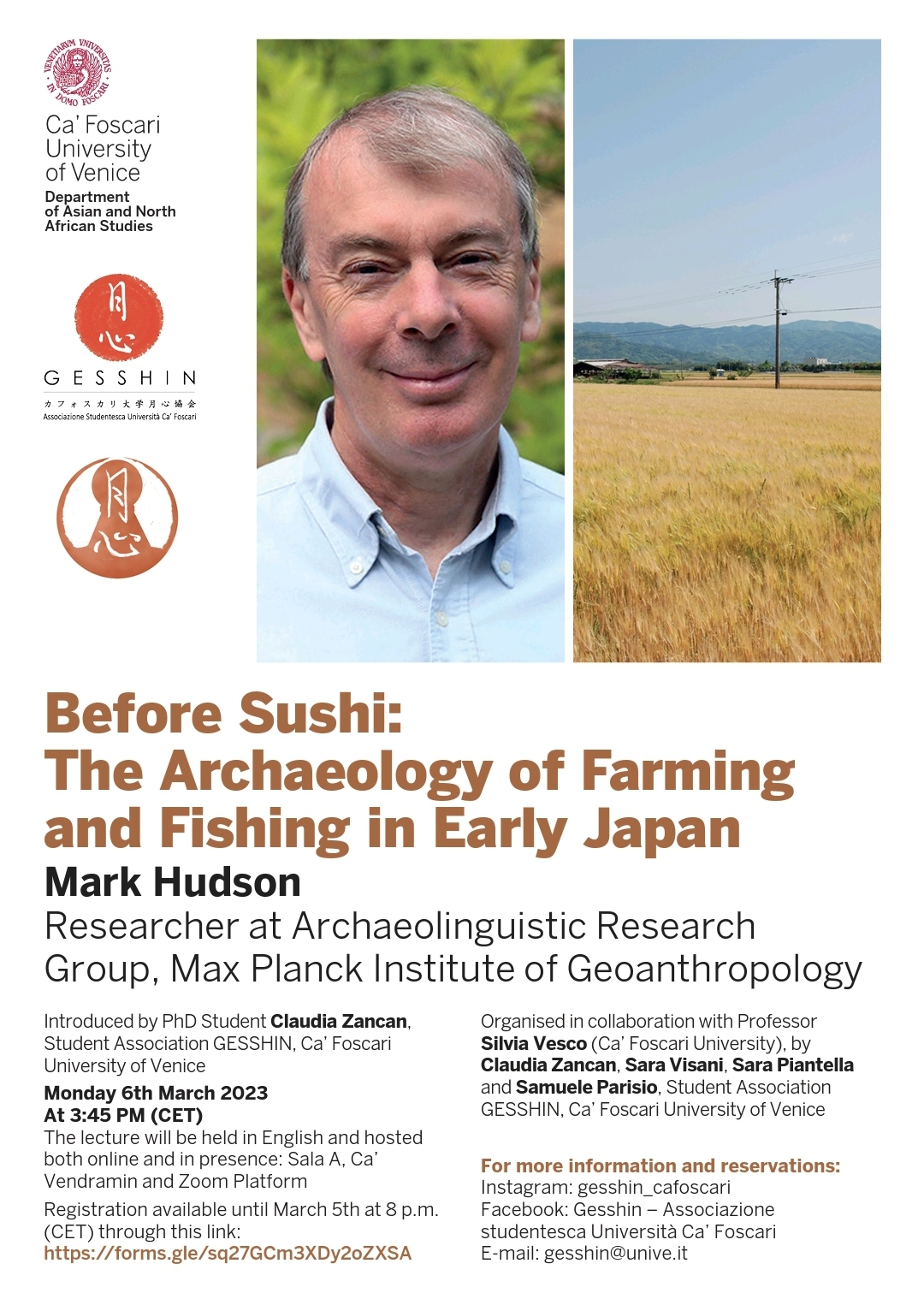Title: Before Sushi: The Archaeology of Farming and Fishing in Early Japan
Series: Unearthing Japanese Archaeology - Re-discovering ancient Japan through contemporary studies
Speaker: Mark Hudson, Researcher, Archaeolinguistic Research Group, Department of Archaeology, Max Planck Institute of Geoanthropology
Format: Hybrid: Sala A, Ca’ Vendramin - Ca’ Foscari University; ZOOM
Registration is available until March 05 at 8 p.m. (CET, Italy) through this link.
You will receive a participation link on the 05th of March after 9 pm. If you do not receive the link, please send an email to gesshin@unive.it
Date: 06 March 2023 (Monday)
Time: 15:45 (CET, Italy)
Organized by: in collaboration with Professor Silvia Vesco (Ca’ Foscari University), organized by Claudia Zancan (PhD Student Ca’ Foscari University), Sara Visani, Sara Piantella and Samuele Parisio, Student Association GESSHIN, Ca’ Foscari University of Venice - Department of Asian and North African Studies
For more information and reservations: gesshin@unive.it
https://www.unive.it/data/agenda/4/70764
Abstract
Sushi has become one of the most globalised foods in the contemporary world, yet it is also symbolic of what is often perceived of as the ‘traditional’ Japanese diet and food culture based on rice and fish. This talk will use archaeology to re-evaluate and critique such ideas. Japan was one of the last places in temperate Eurasia to adopt full-scale agriculture. Resistance to farming was one characteristic of Japanese prehistory, complicating assumptions that rice was adopted with minimal disturbance in the Bronze Age Yayoi period. The agriculture that reached Japan after 1000 BC was a highly globalised Eurasian system including millets, barley and wheat as well as rice. Prunus arboriculture also took on great importance by the Late Yayoi. Pigs and chickens were present by the first millennium BC, but the role of domesticated animals in Japanese agropastoralism remains poorly understood. Based on the speaker’s recent research, the talk will focus especially on archaeological and historical evidence for the use of wheat, Prunus fruits, chickens and wild fowl, and fishing. Despite recent advances in Japanese archaeobotany and zooarchaeology, many questions remain as to how the various elements of the premodern subsistence economy came together. The talk will argue that the commercialisation of premodern food resources, a process that seems to have begun as early as the Bronze Age, was a key factor that deserves more attention.
Mark Hudson is an archaeologist in the interdisciplinary Eurasia3angle research group where he works on integrating archaeological data with historical linguistics and ancient DNA to understand population movements in Neolithic and Bronze Age Northeast Asia. He is also interested in the archaeology of ancient globalisation, food, resilience, and violence. Mark Hudson was educated at SOAS (BA, 1986), Cambridge (M.Phil., 1988) and the Australian National University (PhD, 1996). He taught archaeology and anthropology at Okayama, Tsukuba and West Kyushu universities from 1996 to 2015. From 2016-2017, he was Professor at the Mt Fuji World Heritage Centre, Shizuoka where he helped design the prize-winning exhibits on Mount Fuji. He has conducted archaeological fieldwork in Japan, Israel, Syria, the UK and Slovenia. Mark is a research associate of the Institut d’Asie Orientale, ENS de Lyon and currently co-supervises PhD students Julia White and Izumi Braddick (Oxford).

